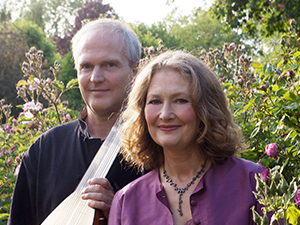Early Music Indianapolis: Emma Kirkby, a star of early music who blazed trails with apt vocal style, makes a festival appearance with lutenist Jakob Lindberg
 |
| Jakob Lindberg and Emma Kirkby are seasoned collaborators. |
A program of music by the English composer and his contemporaries couldn't have been in better hands than it was Sunday afternoon at the Indiana History Center in an Indianapolis Early Music presentation: Emma Kirkby, soprano, and Jakob Lindberg, Renaissance lute.
The concert, "Like as a Lute," scrupulously curated by the artists and lovingly performed, crowned the second weekend of the festival's 50th-anniversary season.
The program title is drawn from the first line of a sonnet by Samuel Daniel — like Dowland, a contemporary of William Shakespeare's. The polished poem later refers to the lute's "warble," a word associated with bird song, which I don't hear in the instrument's sound. But it must be there to poets who celebrate it, as they frequently do when it comes to bird voices. John Dryden also extolled the warbling lute. (To me, there's often something a little off when poets describe music: one thinks of Coleridge's reference to "the loud bassoon" in "The Rime of the Ancient Mariner.")
The warbling comparison is likely by association, especially when the instrument is played by such a master as Lindberg. The lute's floating, ethereal sound connotes the appeal of chirping birds, often unseen in the trees around us. Besides, though there are bird songs taken to express sadness, "avian Andrews sisters" (as Ogden Nash termed them in his verses for Saint-Saens' "Carnival of the Animals") are usually interpreted as expressions of perky cheer and joie de vivre.
Master lute composer Dowland was personally a mixed bag of emotions. Though one of his contemporaries called him "a cheerful person ... passing his days in lawful merriment," the Grove's Dictionary entry on him notes his gnawing resentment at failure to land a court position, and finds seesawing emotions characteristic of his compositions as well: "Though capable of writing charming trifles, all his greatest works are inspired by a deeply felt tragic concept of life, and a preoccupation with tears, sin, darkness, and death."
For example: From the glum basis for one of the solo lute pieces heard Sunday afternoon — a four-note descending chromatic pattern — "Forlorn Hope Fancy" eventually flowers into an outburst of lute brilliance from which a positive attitude toward life can be felt. In both sunshine and shadow, it was one of the highlights of the recital before intermission.
There were also songs from Dowland's contemporaries John Danyel, Edward Collard, and Robert Jones — the gist of which was melancholic. After intermission, Lindberg and Kirkby turned to the Continent, where Dowland spent much of his career. Following an attractive French set — performed for an audience forced to follow the provided texts in dim light — there were whirlwind tours of Spain and Italy.
Most haunting in this part of the program was the finale, Tarquinio Merula's, "canzonetta spiritual" on "La Nanna," with its narrow two-note range in the lute's low register, above which Kirkby sang expressively a text reflecting both the Virgin Mary's interest in rocking her baby to sleep while displaying foreknowledge about the way his earthly life would turn out.
As she had earlier, Kirkby demonstrated her particular value in this repertoire. A soprano with a clear, almost vibratoless voice and the kind of delivery, especially in her middle to low range, as unpretentious as a good folksinger's, she has done much to uphold the kind of singing suitable to early instruments. There's no forcing; her kind of naturalness also makes her precise command of ornaments seem at one with whatever tune she may be singing. On Sunday afternoon, there were a few phrase ends that sounded wispy or slightly hoarse, but at 67, Kirkby seems still to have the control, direct expressivity and buoyancy that made her famous.
After an entraptured ovation, Kirkby and Lindberg returned to the stage with an encore. It was more dour Dowland: "Can She Excuse My Wrongs," a song set to a galliard that is traditionally linked to another gentleman who failed to find favor at Queen Elizabeth's court. The Earl of Essex paid for his more open opposition to the Queen with his life. Dowland may have been disappointed in his sovereign, but at least he kept his head.



Comments
Post a Comment